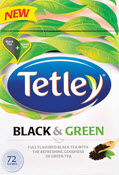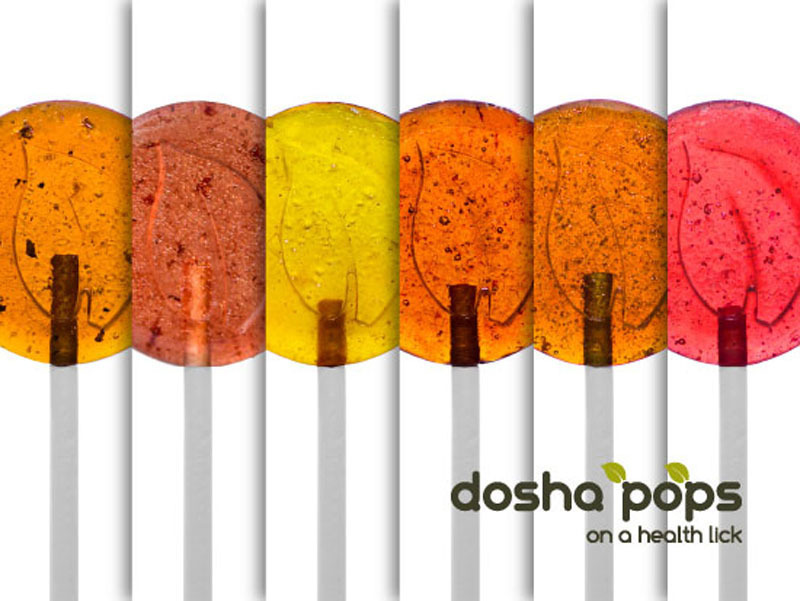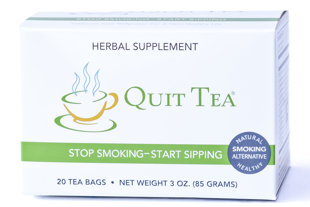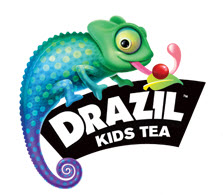What tea professionals need to start the week..—
Assure your customers who are resolved to lose weight that tea really does burn calories1… Tetley just launched a blend of green and black tea to bring tea drinkers the best of both… author Jeff Fuchs describes in a video interview an arduous 5,000 kilometer trek for his 2008 book The Ancient Tea Horse Road… India will subsidize construction of micro factories to help small growers improve tea quality… Matt Bucklin’s PowerPitch that Quit Tea helps you break free of cigarettes got two thumbs up last week and for those high-energy types who never need a New Years diet Dosha Tea Pops will satisfy your lollipop cravings.
Health
Can Tea Really Help You Lose Weight?
As calendars flip open to a new year, resolutions are made, many having to do with weight loss. Soon thereafter tea sellers will start to hear the popular question: “What is the best tea for losing weight?”
Some in the industry are strong believers in the idea of tea as a panacea, that it can help with all aspects of health, including weight loss. Others are firmly committed to encouraging a love of tea without focusing on health benefits, worried that its impact might be overstated. A third contingent find themselves somewhere in between, unsure of what is proven and what is lore. Fortunately there are now updated reports that help to present the latest information in clear documents.
In December 2013 the American Journal of Clinical Nutrition (AJCN) contained twelve reports from the Fifth International Scientific Symposium on Tea and Human Health (Sept. 2012). One of the summary papers was titled “Catechin- and caffeine-rich teas for control of body weight in humans.”
In the AJCN report, it was indicated that studies showed a combination of tea’s polyphenols and its caffeine resulted in an increase in calorie burn in tea drinkers. A further review found that study participants who consumed green tea and caffeine over a 12 week period without changing other components of their diets, lost an average of 2.9 pounds. The population-based studies continued the good news for tea drinkers. People who consume tea regularly have lower Body Mass Indexes (BMI) than those who do not drink tea. They also had less overall body fat.
In summary, it appears that tea has the potential to have a positive impact on weight control. As for the perfect tea for weight loss? As a wise teacher once told me, “It’s the one that they’ll drink regularly.”
1Catechin- and Caffeine-rich Teas for Control of Body Weight in Humans
Researchers: Rick Hursel and Margriet S Westerterp-Plantenga
Am J Clin Nutr 2013 98: 6 1607S-1610S. October 2013.
Retail
Reily Foods Acquires New England Tea & Coffee
NEW ORLEANS, La. – Reily Foods has acquired New England Tea & Coffee Company, a Massachusetts-based firm in operation since 1916.
New England Tea & Coffee is one of the largest independent coffee roasters in the country with a line of bagged and flavored coffees, teas and single-serve capsules. The company’s packaged coffee is available in supermarkets across the U.S., online and brewed at more than 5,000 foodservice locations.
![]() Terms were not disclosed and day-to-day operations will be as usual, according to Reily, a New Orleans, Louisiana-based food manufacturer and distributor.
Terms were not disclosed and day-to-day operations will be as usual, according to Reily, a New Orleans, Louisiana-based food manufacturer and distributor.
Reily brands include Luzianne Tea, Luzianne Coffee, French Market Coffee, CDM Coffee, JFG Coffee and several condiments, dressings and sauces. Learn more at: www.reilyfoods.com.
Origin
KOLKATA, India — India’s tea estates are near capacity giving small growers a critical role in meeting domestic demand, according to outgoing Tea Board Chairman M.G.V.K. Bhanu.
A steady and judicious investment in tea estates is critical for survival of the tea industry, said Bhanu, citing the fact that small growers already account for 35% of the billion kilos India produced last year. Bhanu cautioned tea companies “to set aside a sizable portion of their surpluses for ploughing back in replantation and irrigation” and he urged a larger allocation of government funds to small growers.
Production in a majority of big gardens has virtually reached the saturation point, he told the Hindu Business Line. In the absence of regular investments on maintenance of tea estates, production of green leaves would continue to decline.
Annual exports have remained around 200 million kilos for the past half century, while domestic demand is booming, he said. Small growers, newly defined as those with holdings up to 25 acres (10 hectares) are ideally positioned to meet an estimated annual increase of 30 million kilos per year purchased by domestic tea drinkers. In five to seven years small growers are expected to produce 50% of the country’s tea.
Bhanu has championed subsidies for growers willing to operate mini- and micro-factories. This will improved freshness by cutting transport time, raise plucking standards and reduce handling of green leaf from small gardens, said Bhanu. Micro factories are those producing less than 200 kilos a day. Mini factories produce more than micro factories but less than 500 kilos daily. Neither will be required to register under the Tea Marketing Control Order, 2003. This will relieve small operators of expensive paperwork and regulations necessary for large factories. A subsidy of up to 40% is available for the cost of machinery, construction and improvements (excluding the purchase of land) of their factories.
Bidyananda Barkakoty, Chairman of North Eastern Tea Association (NETA) to the Hindu that “If the small tea growers are able to set up their own factories within their plantation area the quality of tea will definitely improve because of improvement in plucking standards, less transportation time and less handling of green leaf. It will also generate huge employment at local level.”
The emphasis should be exporting quality and value-added tea and the focus should be on countries such as the U.S., Russia, Iran, Egypt and Kazakhstan. “The opportunities held out by Pakistan should also be carefully explored,” he said.
Training, motivating and retaining tea workers is a challenge. “Garden owners in North India must take care of their workers; otherwise there will be shortage of manpower as it has happened in south Indian gardens,” Bhanu to The Hindu Business Line.
Sources: The Hindu and The Hindu Business Line
Retail
Sweepstakes Helps “Get Your Bits Fit”
NEW YORK, New York – TEAS’ TEA® will award Fitbit Flex Activity™ Trackers daily through January to help consumers keep their New Year’s Resolutions.
![]() The wireless wearable devices sync to smartphones or computers to track physical activity stats, helping motivate daily fitness goals. Consumers can enter every day on the TEAS’ TEA® Facebook page, for a chance to win one of these fitness wristband devices.
The wireless wearable devices sync to smartphones or computers to track physical activity stats, helping motivate daily fitness goals. Consumers can enter every day on the TEAS’ TEA® Facebook page, for a chance to win one of these fitness wristband devices.
To enter visit Facebook.com/itoen.teastea or #GetYourBitsFit.
Learn more at www.teastea.com
Innovation
Tetley USA blended black and green teas to achieve the full flavor of black tea and the health benefits of green tea, without the bitter taste often associated with green tea.
 “We have heard from consumers that they would like to drink more green tea for its renowned benefits, but aren’t always happy with the taste,” said Tetley USA’s Marc Birnbaum. “With our new Black & Green blend, tea drinkers don’t have to compromise.”
“We have heard from consumers that they would like to drink more green tea for its renowned benefits, but aren’t always happy with the taste,” said Tetley USA’s Marc Birnbaum. “With our new Black & Green blend, tea drinkers don’t have to compromise.”
Tetley Black & Green blend is available in a new flip-top 72-ct. box. Tetley and Good Earth Tea are owned by Tata Global Beverages. All Tetley branded tea will be Rainforest Alliance certified by 2016, according to the company.
Dosha Tea Pops Promote Ayurvedic Lifestyle
Everyone needs to occasionally satisfy a craving for sweets and Dosha Pops tea-based lollipops meet the need. Finding balance through Ayurvedic principles of holistic healing inspired founder Peggy Andrews to create the natural treat in flavors that include Chai Me Up (chai spice Tulsi and coconut), Head Over Hibiscus, Velvet Rope (Chicory) and Inner Glow (lemon, turmeric and ginger)
 According to Ayurvedic beliefs, each person also has a unique pattern of energies like a fingerprint called “doshas,” said Andrews. “Through the use of herb mixtures, plants, teas, common oils, and spices, Ayurveda’s key mission is simple: to bring the dosha back into balance.
According to Ayurvedic beliefs, each person also has a unique pattern of energies like a fingerprint called “doshas,” said Andrews. “Through the use of herb mixtures, plants, teas, common oils, and spices, Ayurveda’s key mission is simple: to bring the dosha back into balance.
“We strive to offer healthful candies so that people don’t feel they need to totally abstain from sweets and can still feel good about eating them when they do satisfy their cravings,” stated Andrews. Learn more at: Dosha Pops
Health
Two years ago Matt Bucklin launched Quit Tea because replacing a bad habit with a good habit is easier than simply curbing a bad habit. His advice to Stop Smoking — Start Sipping caught the eye of Yahoo! PowerPitch producers and last week two of the three investors on the show gave him a thumbs-up. Bucklin had 60 seconds to make his case. He said that he came up with the idea after he quit smoking himself with the help of herbs.  “It helps temporarily support willpower, improve lung health, detoxify the body, and reduce hunger,” said Bucklin. He calls it the Substitution Strategy for Quitting Smoking. The New York-based self-funded startup is two years old. Quit Tea is distributed nationally in retail locations like Whole Foods Market and Walgreens, and sold internationally in Canada, China, and Western Europe. Bucklin said 250,000 have tried the herbal supplement. Learn more at: www.quittea.com
“It helps temporarily support willpower, improve lung health, detoxify the body, and reduce hunger,” said Bucklin. He calls it the Substitution Strategy for Quitting Smoking. The New York-based self-funded startup is two years old. Quit Tea is distributed nationally in retail locations like Whole Foods Market and Walgreens, and sold internationally in Canada, China, and Western Europe. Bucklin said 250,000 have tried the herbal supplement. Learn more at: www.quittea.com
Tea Horse Road
Elyse Petersen of Tealet sat down for tea and talk with Jeff Fuchs, author of The Ancient Tea Horse Road and Founder of Jalam Teas. For thirteen centuries, one of the planet’s most daunting journeys and most remarkable trade routes remained a mystery to all but a few journeyers and residents along its 5000 kilometer length. Elyse and Jeff discuss how Jeff found his way to the mountains of Yunnan trekking over the almost forgotten ancient trade route. Jeff also discusses the production and market for Pu-erh works and how to get your hands on the most prized teas of Yunnan, China. See the video on Vimeo.
Asides
 Drazil Kids Tea, a finalist in the Dream Big America competition didn’t win last week but co-founder Christine Wheeler was upbeat over the firm’s success. The caffeine-free organic blend of herbal teas infused with fruit juices is selling well in natural grocery stores and a hit with Christine’s four kids. Learn more at: Drazil Kids Tea.
Drazil Kids Tea, a finalist in the Dream Big America competition didn’t win last week but co-founder Christine Wheeler was upbeat over the firm’s success. The caffeine-free organic blend of herbal teas infused with fruit juices is selling well in natural grocery stores and a hit with Christine’s four kids. Learn more at: Drazil Kids Tea.
Colder than Mars

Winnipeg drew the world’s attention briefly this week when scientists noted that the New Years Eve low of -37.9C was considerably below temperature readings from the surface of Mars. Airports recorded -53C degrees in parts of Manitoba Province last week while the Curiosity Rover in the Gale Crater on Mars enjoyed a balmy -29C. United Airlines canceled flights to and from the city for two days due to safety concerns. The Winnipeg Sun noted that December was the coldest month in 80 years and the second coldest in 120 years… temperatures (without wind chill) averaged -20.9C in the city of 635,000 last month about -10C degrees colder than the North Pole.
— — —
Tea Biz serves a core audience of beverage professionals in the belief that insightful journalism informs business decision making. Tea Biz reports what matters along the entire supply chain, emphasizing trustworthy sources and sound market research while discarding fluff and ignoring puffery.
Tea Biz posts are available to use in your company newsletter or website. Purchase reprint and distribution rights for single articles or commission original content. Click here for details.



3 responses to “Need to Know (Jan. 6, 2014)”
The Abstract of the article linked in your opening seems more circumspect in its claims than your headline. It talks about the potential of catechin and caffeine rich teas (CCRTs) to produce significant effects, the limitations of the approach, and concludes that CCRTs may be useful agents. Is there another article from the Symposium more definitive in its support of your headline?
The abstract is a useful starting point as it was widely circulated by the media but the Tea Council of the USA has a much longer list of peer-reviewed research papers attesting to the fact that the caffeine in tea does increase metabolism, burning calories. The catechins and polyphenols in tea do bind with fat making less available to the body. In the report cited the combination resulted in weight loss. The qualifier is always “significant.” Participants in the study lost an average 2.9 pounds in 12 weeks and kept it off. I advise retailers they can confidently state the above and that people who consume tea regularly have lower Body Mass Indexes than those who do not and less overall body fat. They also benefited from hydration and the many other health benefits associated with drinking tea (additional American Journal of Clinical Nutrition cited here). WebMD offers a similar assessment and a list of useful articles including Drink Your Way To Weight Loss and Skinny Sipping – The Best & Worst Beverages for Weight Loss. The content of these articles was reviewed by qualified physicians. Retailers should caution there are no “easy fixes.” Exercise and consuming fewer calories each day are what lead to weight loss, but tea is clearly helpful as it contains zero or few calories and is a great substitute for high-calorie beverages.
Thanks for the links. Noticed the link to Skinny Sipping is bad but the article can be found at http://www.webmd.com/diet/features/drink-pounds-away